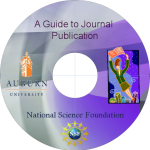

Finding a Journal
Finding an appropriate journal to submit your work is an extremely important step that should not be overlooked. It is imperative that the author submit his or her paper to an appropriate journal. There are many different types of journals out there and selecting the right one can mean the difference of publication and rejection.
Here are some key points that may assist in journal selection:
- The internet and the library are great sources for researching different journals in your field to help you decide on an appropriate journal for your paper. Consider the journals that you read and cite - these are most often the logical places for your own research.
- The quality of different academic journals varies, placing each in a different category or ranking. Journals fall between the categories of top tier ("A journals"), second tier, middle tier, and lowest tier. Many academics are using "Impact Factors" to rate journals. Please see the section on this CD for more information.
- Choose a journal that tends to publish your type of paper. If you have written an empirical paper, do not choose a journal that publishes only theoretic works.
- A good way to choose an appropriate journal is to examine the journals which have published your paper's cited works, especially recent cites. This means that the topic is of interest to the journal and its readers.
- A rule of thumb is to aim at the "best" journal to which your paper stands a reasonable chance of being accepted. If you aim too high, you will have wasted a year or so of time and have to send it elsewhere after rejection. If you aim too low, your good paper may not be read as widely and your own C.V. will have been shortchanged.
- As a new academic be highly cautious of new journals. While some of these may be of high quality and may become prestigious, any new journal has no track record and therefore will be less familiar to those reviewing your C.V. A new journal may not be abstracted in the main online databases. A new journal may promise to expedite review and publishing, but the trade off in the visibility and regard for your article is probably not worth it.
- Even if your work is in a certain technical niche, you should endeavor to publish at least a few papers in the mainstream journals of your academic field. If you come up for tenure and promotion and most of the reviewers on the committee have not heard of the journals you publish in, this could be a negative. Also, publishing in the mainstream journals will enhance your overall visibility and increase the probability of positive letters from external reviewers when your tenure/promotion case comes up.
- It is perfectly acceptable to have more than one different paper in review at the same time, even at the same journal. However, it is unethical (and can be even illegal) to have the same (or substantially the same) paper in review at more than one journal at the same time. This is paper duplication and is discussed in this CD under the Ethical Considerations.
- Strive to have publications in multiple good journals. Having a few papers in just one top journal is not as impressive as having a few papers in a variety of top journals. However, keep in mind that not all papers warrant publication in a top journal and even the best scholars have publications in second tier journals.
- Avoid submitting to a journal that has repetitively rejected your articles. Generally, if rejection has occurred three times in row, the editor may still remember bad remarks about your papers or your work may not be suitable for that journal.
- Aim to meet quite a few active people in your field before submitting your paper. Any of these people could very well end up being your referee. Try to get to know these people at professional meetings during the year.
